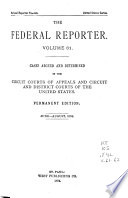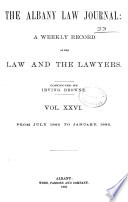 | 1894 - 2074 pages
...definitions. Webster expresses it tersely when he says: "By the 'law of the land' is meant the 'general law,' which hears before it condemns; which proceeds upon inquiry, and renders judgment only on trial." The party to be affected by the process which deprives him of his life, liberty, or property,... | |
 | 1904 - 1148 pages
...act of power. In the language of Mr. Webster in his famous definition, 'It is the general law, the law which hears before it condemns, which proceeds upon inquiry and renders judgment after trial, so that every citizen shall hold his lite, liberty, property, and immunities under the... | |
 | Benjamin James Lea - 1880 - 820 pages
...Perhaps no definition is more often quoted than that given by Mr. Webster in the Dartmouth College case. By the law of the land, is most clearly intended the general law—a law which hears before it condemns; which proceeds upon inquiry, and renders judgment only... | |
 | 1881 - 1116 pages
...language by Mr. Webster in the Dartmouth College case, is very often quoted. He said in that case: "By the law of the land is most clearly intended the...trial. The meaning is, that every citizen shall hold his life, liberty, property, and immunities under the protection of the general rules •which govern... | |
 | Elizabeth Cady Stanton, Susan Brownell Anthony, Matilda Joslyn Gage - 1881 - 1018 pages
...references with Mr. Webster's celebrated definition in the Dartmouth College case (4 Wheaton. 581) : By the law of the land is most clearly intended the...renders judgment only after trial. The meaning is, that ever)' citizen shall hold his life, liberty, property, and Immunitic.-, under the protection of the... | |
 | Vermont. Supreme Court - 1882 - 790 pages
...was that of Mr. Webster, in his argument in the celebrated Dartmouth College case. He says it is the law " which hears before it condemns, which proceeds...upon inquiry, and renders Judgment only after trial. Everything which may pass under the form of an enactment, is not therefore to be considered the law... | |
 | West Virginia. Supreme Court of Appeals, Edgar P. Rucker - 1883 - 926 pages
...property, without due process of law, and the judgment of his peers" — Const, of W. Va., art. 3, sec. 10. "By the law of the land is most clearly intended the...trial. The meaning is that every citizen shall hold his life, liberty, property and immunities, under the protection of the general rules which govern... | |
 | United States. Supreme Court - 1883 - 890 pages
...Judge Cooley, " is more often quoted than that given by Mr. Webster in the Dartmouth College case : ' By the law of the land is most clearly intended the...trial. The meaning is that every citizen shall hold his life, liberty, property, and immunities, under the protection of the general rules which govern... | |
 | United States. Supreme Court - 1883 - 1004 pages
...Judge COULEY, "is more often quoted than that given by Mr. WEBSTER in the Dartmouth College Case: ' By the law of the land is most clearly intended the general law — a law which hears before it con demns; which proceeds upon inquiry, and renders judgment only after trial. The meaning is that... | |
 | 1883 - 572 pages
...been given, was that of Mr. Webster in his argument in the Dartmouth College case. He says it ia the law " which hears before it condemns, which proceeds...upon inquiry, and renders judgment only after trial. Everything which may pass under the form of an enactment, is not therefore to be considered the law... | |
| |